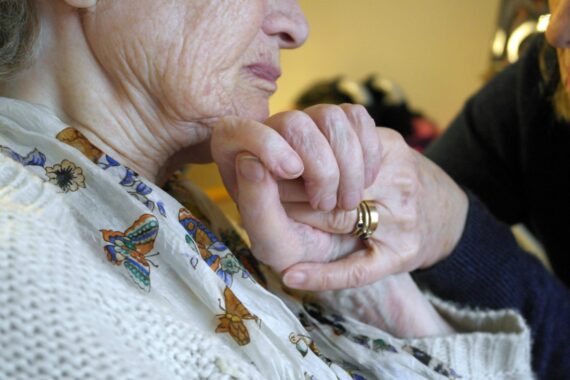‘Long way to go’ before ‘game-changing’ Alzheimer’s drug reaches NHS

Researchers reporting the results of a phase 3 trial of a monoclonal antibody treatment in Alzheimer’s disease say the drug can slow progression of the disease by removing the build-up of amyloid protein in patient’s brains.
But while the results have been hailed as potentially ‘game-changing’ in a field where research progress has been limited, experts warned it would be some time before such treatments were in use on the NHS.
And there remain unanswered questions about the impact of the treatment in the longer term, how patients would be identified and monitored, and the safety profile of the drug.
The trial of 1,795 patients published in the New England Journal of Medicine found that disease progression was slowed by 27% over an 18-month period in patients taking lecanemab compared with placebo.
At the same time, brain scans showed reduced markers of amyloid in patients with early Alzheimer’s disease taking the drug, which was given as an intravenous infusion every two weeks.
But there were adverse events with infusion-related reactions in 26.4% of the participants and amyloid-related imaging abnormalities with oedema or effusions in 12.6%, the team reported.
An investigation published earlier this week in Science had raised questions about two deaths associated with the trial. There was no increased risk of death in the treatment arm of the study, researchers reported.
Lecanemab, developed by Biogen and Easai, is the first drug for Alzheimer’s disease that has shown to change the trajectory of the disease and it is believed it will be approval by US regulators early next year.
Professor John Hardy, group leader of the UK Dementia Research Institute at UCL, said the trial had included people with comorbidities and as such was closer to ordinary clinical practice than many are.
‘They showed efficacy in Asians and African Americans and Hispanics as well as whites. The trial met not only its major endpoint but also met all the secondary endpoints too,’ he added.
‘There is a long way to go for approval and the use of these drugs in standard clinical practice… but undoubtedly this is the first stage.’
Others agreed this could be the start of a new era of Alzheimer’s drugs but noted that health systems were not currently equipped to deliver such therapies or identify who would most benefit.
Dr Richard Oakley, associate director of research at Alzheimer’s Society, said the results could be ‘game-changing’ but this was not the end of the journey for lecanemab, which would need to be assessed over a longer period.
‘The safety of drugs is crucial and lecanemab did have side effects, but they will be closely looked at when decisions are made about whether or not to approve lecanemab, to see if the benefits outweigh the risks.
‘There is still a long way to go before we could see lecanemab available on the NHS, and we await clarity for how and when the approval process will take place in the UK, and whether regulators believe it is cost-effective.’
He added: ‘We mustn’t forget that lecanemab can only be given to people with early Alzheimer’s disease who have amyloid in their brain. This means people with other types of dementia, or in the later stages of Alzheimer’s disease, can’t benefit from this drug.’
Visit Pulse Reference for details on 140 symptoms, including easily searchable symptoms and categories, offering you a free platform to check symptoms and receive potential diagnoses during consultations.
Related Articles
READERS' COMMENTS [4]
Please note, only GPs are permitted to add comments to articles










Yeah, start with social services and an incontinence pad first.
It’s not “game-changing”; the results are quite modest, there are significant risks, it’s hugely expensive and only a small subset of those diagnosed will be eligible.
DH is correct, Biogen have done a fantastic PR job in splashing this “game changer” across the media, cruelly raising false hope in many patients and their families. Slowing progression over 18 months by 27% is hardly a miracle cure, will clearly only benefit a tiny minority of patients diagnosed early with appropriate brain scan results, and has many safety hurdles to clear before being unleashed on the public.
We see this clever publicity of false dawns all the time. Remember when donepezil and memantine were trumpeted as “game changers”?
And for decades we’ve had repeated headlines of breakthrough treatments for Parkinson’s, yet we still dish out the Madopar and watch the patients slowly freeze.
@DB and @DH
everything you both said… plus requires fortnightly hospital day unit attendance.